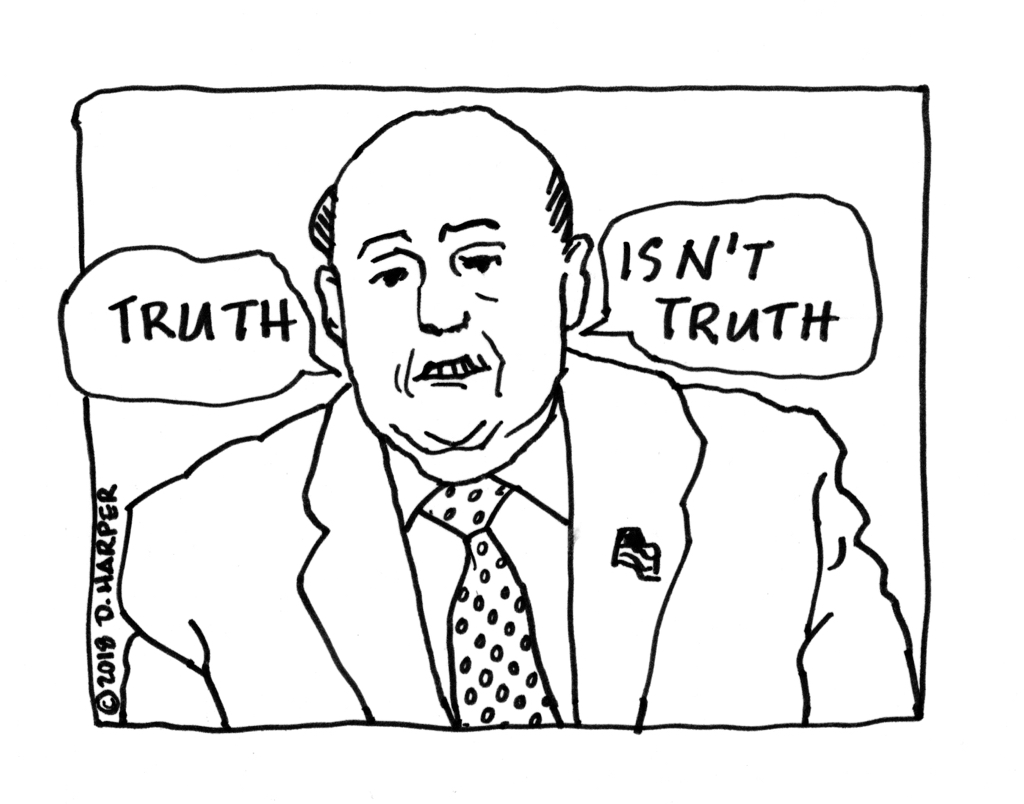“Truth isn’t truth,” said Rudy Guiliani on NBC’s “Meet the Press.” He later tried to clarify that his “statement was not meant as a pontification on moral theology.”
Actually, I would argue that Guiliani’s statement has more to do with philosophical epistemology than with moral theology; that is, with the philosophical study of how we know the world. I would further argue that Guiliani’s statement reveals his indebtedness to the philosophical stance of postmodernism. To see what I mean, the first paragraph of the Stanford Encyclopedia of Philosophy’s entry on postmodernism may prove helpful:
“That postmodernism is indefinable is a truism. However, it can be described as a set of critical, strategic and rhetorical practices employing concepts such as difference, repetition, the trace, the simulacrum, and hyperreality to destabilize other concepts such as presence, identity, historical progress, epistemic certainty, and the univocity of meaning.”
The relevant point here, I think, is that post-modernist statements such as “truth isn’t truth” and “alternative facts” can be considered attempts to destabilize the concept of epistemic certainty and univocity of meaning — that is, these are attempts to upset my sense that I can know something to be true, and to upset my sense that truth is the same for all reasoning beings. Statements such as these are trying to make us feel that we do not know the world adequately, and that we cannot know the world adequately through use of reason.
Guiliani’s statement is notable for its lack of nuance. I also think we’re seeing an uptick in fascist politics in the United States, a politics which increasingly seems to rely on postmodern destabilization of epistemic certainty. I see this as a troubling trend: a link between fascism and the denial of epistemic certainty.
At the same time, I’m also thinking that some discourse by political liberals may also prove destabilizing to epistemic certainty, though with different intention and probably different ultimate effects. Some varieties of identity politics may involve assertions that person within one identity group cannot fully understand persons in another identity group, which assertions, if nuanced, may be useful and reasonable. For example, a woman could say to me, with great reasonableness, that because I’m a man I cannot understand many aspects of what it’s like to be a woman. Usually, there are several levels of understanding implicit in such a statement, e.g.: that while a man can’t understand fully what it is like to be a woman nevertheless a man can reason out something of what women experience (as exemplified by male novelists who write reasonably convincing female characters); that a transgender person who transitions from male to female can experience something of both male and female directly; and so on.
In a similar vein, scholar of religion Stephen Prothero asserts in his book God Is Not One that religions have different goals and different end points — and he also makes it clear that it’s possible to engender understanding between different religions, and between practitioners of different religions. In sum, then, one can assert that certain kinds of understanding between different persons may never be fully possible, while at the same time leaving room for the possibility that significant understanding may happen with effort. As a man I’m never going to experience what it’s like to bear a child, but there are conditions under which I can reason out or empathize with that experience. As a Unitarian Universalist, I’m never going to experience the submission to Allah characteristic of Islam, but there are conditions under which I can reason out or empathize with that experience.
But here’s where it gets tricky. I think political liberals have to be careful of how they use identity politics. Identity politics has been rightly critical of those who assert truths that are self-serving, as, for example, male scientists who assert that it is a “truth” that fewer women are capable of being scientists. This kind of argument is effective when it it appeals to reason, e.g., by pointing out how one’s bias can affect how one interprets data, i.e., how bias blinds one to reason. On the other hand, identity politics can move into the realm of postmodern destabilization of epistemic certainty, for example with assertions that different identity groups have different truths that can not be mutually understood. If one is going to assert “Your truth isn’t my truth,” one must be careful to explicate how that statement is different from “Truth isn’t truth.”
Postmodernism and postmodern ideas are widespread in our society, and in our public discourse. We are all affected by them. The point I’m trying to make is that we have to be critical of our own discourse, and be aware of how we’re being affected by postmodern efforts to destabilize epistemic certainty. Because no one wants to wind up like Rudy Guiliani, saying in a public setting, “Truth isn’t truth.”

